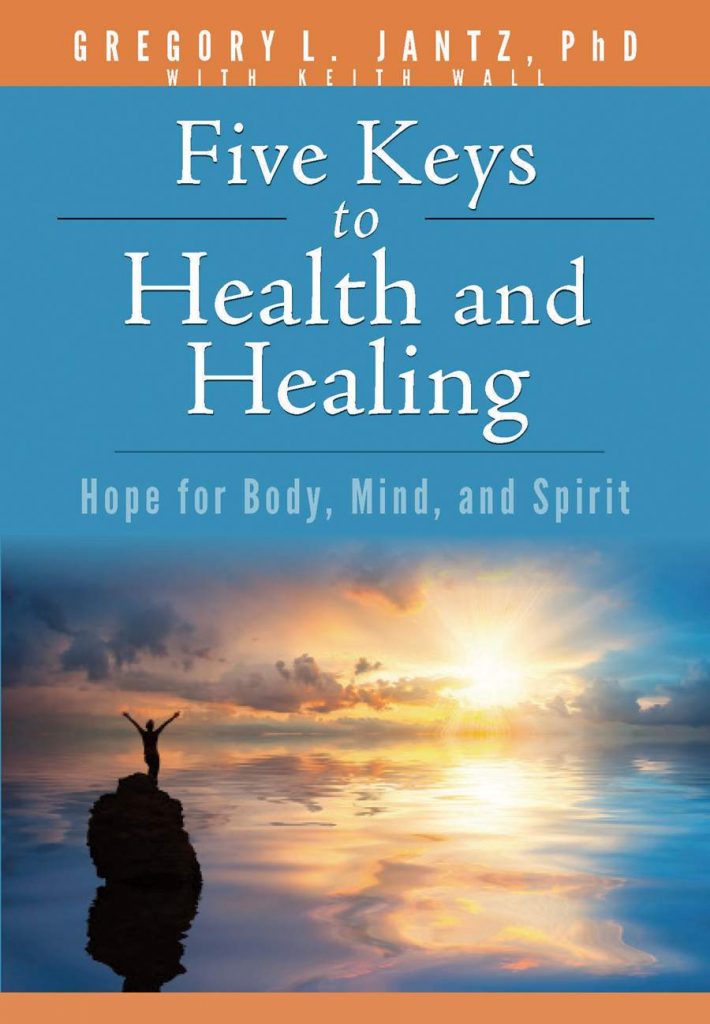from Five Keys to Health and Healing by Gregory L. Jantz
Has modern technology and your ability to access infinite amounts of information and entertainment brought less stress or more stress into your life? Notice I did not say “more convenience” but “more stress.”
Sure, we can buy everything we want online—clothes, computers, and cars—and yes, it’s convenient. But has it made our lives more peaceful?
Most of us would agree that emotional energy has become a precious commodity in our lives. When we feel emotionally depleted, then anxiety and stress are the natural by-products. Left unchecked, stress can lead to feelings of being out of control.
Not everything that causes us stress can be eliminated— nor should it. Low-level stress stimulates the brain to boost productivity and concentration. It can also be a big motivator to make changes, solve problems, or accomplish goals. In addition, many sources of stress are simply beyond our control. That said, there are plenty of stressors we can control.
Here are seven good strategies for you to begin practicing immediately:
1. IDENTIFY YOUR STRESSORS.
Make a list of the factors in your life that contribute to your stress, which might include:
- Relationship tension and troubles
- Overcommitment issues
- Unhealthy habits you use to escape or avoid dealing with issues
- Past regrets that affect the present
- Unhelpful ways of thinking and processing
- Lack of forgiveness for others or yourself
By understanding what creates stress in your life, you can begin to address those things and move toward healing.
2. STOP PROCRASTINATING.
This is a simple—though not easy—way to relieve pressure. Whether you are an occasional procrastinator or a serial procrastinator, your delays and avoidance amp up your stress levels.
3. KEEP YOUR BALANCE.
Protecting your time from overcommitments that are within your control isn’t easy, but it’s one of the most effective things you can do to reduce stress.
4. AVOID NEGATIVE ESCAPES.
When we are stressed, it’s tempting to turn to excessive eating, spending, or substance abuse. That’s because we want to do something to change our mood! Of course, the list of unhelpful and unhealthy escapes could go on and on. Negative escapes only spread the negativity throughout your entire life.
5. ESCAPE IN A HEALTHY WAY.
Thankfully, not all escapes are negative or destructive. In fact, taking a mental and emotional break from the source of stress is a powerful way to improve how you cope, transform your perspective, and help you identify long-term solutions. An escape could be as simple as spending an hour with an enjoyable book in a backyard hammock, or as elaborate as planning a trip to another state.
6. BREAK OUT OF ISOLATION.
Study after study show that supportive relationships are essential to improving how we experience and process stress. In fact, loneliness is linked not only to depression, but also health problems including high blood pressure, cardiovascular disease, cancer, and cognitive decline. Other studies show that people who are involved in faith communities tend to have lower levels of anxiety and stress.
7. TAKE GOOD CARE OF YOUR BODY.
One of the best things you can do to handle the stresses of life is to fortify your health and body. Eating right, getting enough sleep, and exercising regularly relieve feelings of stress and anxiety, improve your mood, and energize your body, brain, and emotions. It’s impossible to eliminate all stress from your life. Managing stress you experience—and how you respond when you experience it—are things you have more control over than you may realize.
The Ultimate Cure for Anxiety
“Do not be anxious about anything, but in every situation, by prayer and petition, with thanksgiving, present your requests to God. And the peace of God, which transcends all understanding will guard your hearts and your minds in Christ Jesus.”
Philippians 4:6–7
Featured image credit: Luis Villasmil
Five Keys to Health and Healing by Gregory L. Jantz
Is there an area of your life you want healing in? Do you find yourself struggling to stay positive? Everyone struggles with a challenge that can lead to hopelessness. Chances are there is an obstacle in your life you desperately want to overcome and you are tired of it weighing you down and holding you back. But how can you move forward? How can you heal?
Instead of solely addressing the healing of emotions or spiritual life, Dr. Gregory Jantz’s proven and effective method encourages the focus on healing the whole person.
About the Author
Dr. Gregory L. Jantz is the author of over 30 books, the host of a national radio program, and a regular contributor to Psychology Today. Recognized as a leading authority on family relationships and much more, he appears as an expert on media such as CNN, FOX, ABC, and NBC. Under Dr. Jantz’s leadership, “The Center: A Place of HOPE” has been voted in the top 10 facilities for the treatment of depression in the United States.





